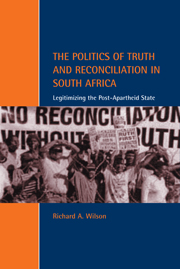Book contents
- Frontmatter
- Contents
- List of Acronyms and Glossary
- Maps
- Preface and Acknowledgements
- 1 Human Rights and Nation-Building
- PART I Human Rights and Truth
- PART II Reconciliation, Retribution and Revenge
- 4 Reconciliation Through Truth?
- 5 Reconciliation in Society: Religious Values and Procedural Pragmatism
- 6 Vengeance, Revenge and Retribution
- 7 Reconciliation with a Vengeance
- 8 Conclusions: Human Rights, Reconciliation and Retribution
- Notes
- Bibliography
- Index
7 - Reconciliation with a Vengeance
Published online by Cambridge University Press: 10 November 2009
- Frontmatter
- Contents
- List of Acronyms and Glossary
- Maps
- Preface and Acknowledgements
- 1 Human Rights and Nation-Building
- PART I Human Rights and Truth
- PART II Reconciliation, Retribution and Revenge
- 4 Reconciliation Through Truth?
- 5 Reconciliation in Society: Religious Values and Procedural Pragmatism
- 6 Vengeance, Revenge and Retribution
- 7 Reconciliation with a Vengeance
- 8 Conclusions: Human Rights, Reconciliation and Retribution
- Notes
- Bibliography
- Index
Summary
Punishment is good. Victims go and watch and they are happy. It prevents further crime. If a person is committing a crime, then the people can say, ‘I'll take you to the imbizo (isiZulu for “court” or “meeting”),’ and the criminal will stop … The law is the law, and it will stay the law. Duma Joseph Motluong, Secretary, Boipatong Residents Against Crime
(Personal interview, Boipatong, 30 January 1997)At no stage since the establishment of the colonial state has there been a single, generally accepted adjudicative and enforcement infrastructure that accommodated the needs of the indigenous population. This milieu led to a plurality of both adjudicative and policing structures and practices which developed and co-existed with varying degrees of compatibility and friction.
Sandra Burman and Wilfried Schärf (1990:735)A SHORT HISTORY OF LEGAL PLURALISM IN SOUTH AFRICA
This chapter examines the relationship between post-apartheid human rights talk and a township justice institution in Boipatong, an African township adjacent to Sharpeville (Map 3). The two townships are only separated by a stinking municipal dump, but the kinds of legal practices one finds in each are very distinct. Specifically, Boipatong has a community court which adjudicates in local disputes and this township is not marred by the wild justice prevailing in Sharpeville.
Before we go on to look at another case of how urban Africans arrive at an understanding and practice of justice different to that found at the national level, it is important to locate township courts in urban African neighborhoods within a wider historical context of legal pluralism in South Africa.
- Type
- Chapter
- Information
- The Politics of Truth and Reconciliation in South AfricaLegitimizing the Post-Apartheid State, pp. 188 - 222Publisher: Cambridge University PressPrint publication year: 2001



